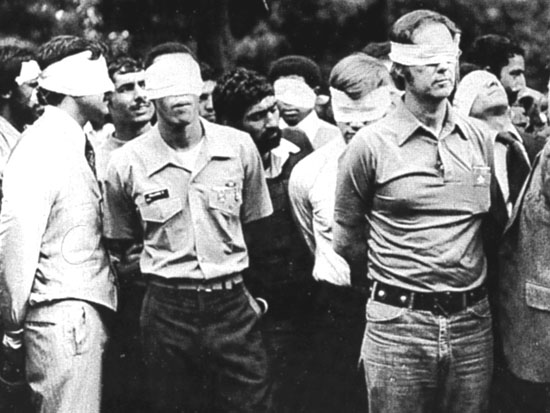Los Angeles Times 11/3/2004
On Nov. 4, 1979, about 300 Iranian students, in an outburst of piety and political action that galvanized their nation’s Islamic revolution, seized the American Embassy compound in Tehran. The students held 53 American diplomats hostage for the next 444 days in an episode that dominated American life and the world’s attention. It was known at the time as simply “the crisis.”
In the 25 years since, anniversaries of the crisis have gone largely unobserved and ignored in the United States. Even in Iran, where the hostage-taking was once celebrated with demonstrations of a million or more, the anniversary has devolved into a hollow ritual of rote and rant, attended by a few thousand schoolkids.
The crisis often seemed like an end when it was happening, but it was actually a beginning: With it, the era of Muslim statehood was introduced to the modern world, as was open religious conflict with the Americans and dominance of Iran by its clergymen. With lt, the posture of the U.S. began to pivot – deflected onto a far more belligerent course by its very first head-on collision with aroused Islam. Both the U.S. and Iran were left with governments they might never have had otherwise, headed in directions few had foreseen. With it, the communal antagonism – Islam versus the U.S. – that eventually collapsed the World Trade Center and punctured the Pentagon first came out of the closet. With it, the template for our most urgent present tense was outlined in the sand, and the opening battle of the American-Islamic war was joined.
And now, as the governments of Iran and the U.S. trade warnings and eye each other with fresh animosity, we may find it worthwhile to remember enough about this anniversary to avoid repeating our mistakes.
At the time of the hostagetaking, we had our Persian Gulf policy pinned to the fate of a monarch – the shah of Iran – whom we counted on as both an oil supplier and an underpinning of American geopolitical presence. He was also the product of American regime change, installed in absolute power for 25 years by U.S.-instigated military coup. The crisis was generated by the eventual blowback from that manipulation. The enormous popular uprising that swept away the shah’s rule caught us by surprise, intelligence about who and what were behind that rising was either nonexistent or wrong, and most of our observation of Iran was made through our political preconceptions, often with reality being missed by a large margin.
As a culture, we had been largely ignorant of the place and people that suddenly came to dominate our communal life, but more than 90% of Americans told pollsters within two weeks of the takeover that they knew about the Iran embassy situation and the hostages.
The hardest part for most was the feeling of impotence, having to come to terms with our inability to “do something” about it, and that difficulty eventually cost Jimmy Carter his presidency. It also, on occasion, made us our own worst enemy.
The crisis resolved itself only when we backed off from trying to impose our will and gained some distance from our own obsession. Throughout, we regularly miscalculated Just how dark a shadow our own hegemony cast on the people we were dealing with.
When warning signs of the risk to the embassy emerged, we overrode those concerns in part because of domestic political pressure, We counted on being able to forestall potential danger by projecting our military power, but the crisis proved beyond our military means.
Remarkably little has changed since Nov. 4, 1979. There is still no American Embassy in Tehran, and the Iranian office in Washington does little but issue visas. The old American Embassy compound seized in the crisis is now under the control of the Revolutionary Guards, who have been using several of its outbuildings as a recruiting depot. The chancery, the former American headquarters, is vacant and stripped bare, opened to the public once a year on the anniversary as a “museum of American imperialism,” but most of the lessons from this 25-year-old collision remain unlearned on both sides. It is not, however, too late.

Leave a Reply